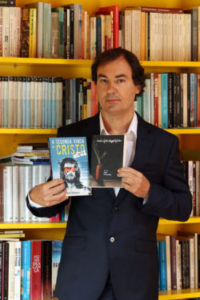Translated from the Portuguese by Chris Mingay
The dictator was worried about the state of the nation.
There were rumors that the people were sad, had lost the joy of living, showed no initiative. The dictator did not understand why this had happened. After all, he was taking care of them, giving them everything they needed, solving all of their problems.
“Why?” he asked himself. “What has happened? ”
He did not know the answer, but he was sure it would be something very serious. His opponents—all in prison—said the reason was the lack of freedom. “Nonsense,” thought the dictator, in his country there is no lack of freedom; everyone could walk on the streets, go to football games or to family outings whenever they wanted. Only people who created problems were arrested. The remaining citizens were even freer than those in other countries because one must be protected to enjoy freedom.
He decided to meet with his three counselors.
“I want to know why my people are depressed. My reputation is at stake. I give you a week to present me reports.”
The counselors cringed and looked at each other.
“The reasons are complex, Mr. President…” said one of them.
“It is our enemies’ fault,” said another.
“The people are like that, they are never happy with anything…” said the third counselor.
“Shut up!” yelled the dictator. “I want concrete evidence. And if within a week you cannot find out the real reason, I will send you to jail. This session is closed.”
A week later the dictator returned to meet with the three counselors. They were pale and thin, with dark circles under their eyes. The dictator had them sit and began to interrogate them.
“You start,” he demanded, pointing a finger at one of them.
The designated counselor closed his eyes, swallowed hard, and finally spoke.
“Mr. President…I studied the problem and came to the conclusion that the people are depressed because…because of global warming.”
“Idiot. Guards, arrest him,” the dictator shouted. He pointed his finger at the second counselor. “You speak now.”
This one closed his eyes and seemed to murmur a prayer before speaking.
“Mr. President…I inquired with the citizens and conclude that…that people are worried about your health.”
The dictator cut him off. “But the one who is going to be sick is you. Guards, arrest him.”
After seeing the first two counselors arrested, the third counselor seemed to accept his fate; he chose the most absurd of his theories to share with the dictator.At the very least, he would mock him.
“Mr. President, the reason is poetry…”
The dictator didn’t expect that. His eyes widened.
“What?”
“Yes, Mr. President, the people are reading too much poetry and getting depressed.”
The dictator frowned.
“Poetry makes people sad? I thought poets spoke of love, happiness, joy of life.”
“Some poets, yes, but ours only make depressing verses. Listen to this poem:
There’s little joy in life for me,
And little terror in the grave;
I’ve lived the parting hour to see
Of one I would have died to save.”
“It really is horrible! This poetry even depresses me.”
The counselor opened his palms. A bead of sweat trickled down his forehead.
“You see? This is the real reason the people are unhappy.”
“Damn poets. I knew that there was something wrong with those guys. What kind of man wastes his time making verses?”
“They are weak people, unable to bear the problems of life. Real men like you, Mr. President, take up arms and fight. Poets lower their arms and cry. Poetry is just that: an endless whimper.”
“You’re right, poets are wretches who corrupt society.”
“Many of them commit suicide to prove that life is meaningless. All that a ruler builds, the poets tear down. And they just need a pen and a sheet of paper.”
“I never thought I could have such an enemy.”
“Poetry is the greatest threat to this government, Mr. President. Other opponents speak their mind, are predictable—we can control them. Poets do not. They hide their intentions and we never know what they’re up to.”
“Poetry is a weapon!” the president proclaimed.
“I’d rather say a poison…”
“From now on, poetry is forbidden. Arrest all of them.”
The next day, all the poets who had published books or verses in magazines and newspapers were arrested. It was decreed that henceforth, poetry, written or spoken, was illegal. The possession of these books would be considered an act of terrorism. The population was forced to surrender all poetry and, at the sound of drums, the books were burned in a square. Into the air, the verses rose in smoke.
“This is for your own good,” said one guards to the people watching the fire.
*
The dictator made some public appearances and noticed some improvement in the population’s mood. He saw a teenage girl smiling, a couple embracing and a madman dancing in the street.
“This may take some time, but in a few months they will be happy again,” he said to himself. Having eradicated poetry was the best decision of his life.
It was during this time, at a party in honor of a newly arrived diplomat, that he met Julianne, the diplomat’s wife. She was an American actress, red haired with green eyes and thick lips, tall and elegant. She was wearing a skin tight lilac dress and high heels. When she walked, her hips undulated, but her breasts remained firm. The dictator had never seen a woman like her. Her voice silenced the surrounding noise. The touch of her hand gave him goose bumps. That evening, he followed her with his eyes and tried to stay close to her, but he was unable to speak to her. His heart caused a lump in his throat and his mouth shut like a jail cell.
He dreamed of her all night.
The next day, he called the last counselor he had left.
“I want the ambassador’s wife,” he demanded. “The redhead.”
The counselor realized he was in trouble again.
“Mr. President, this woman is different from the others. You cannot kidnap the wife of a diplomat. There would be a war.”
The dictator walked toward a window and gazed out at the clouds. His voice came out in a whisper.
“So what?”
“Mr. President,” the counselor reasoned, “that country is stronger than ours.”
The dictator scratched his chin for a few seconds.
“And if she comes to me willingly? There would be no problem, correct?”
The counselor shrugged.
“In that case, I guess not…”
The dictator turned to the counselor and laughed. “So, it will be easy. How could she resist me?”
The counselor forced a smile.
“Yes, how could she?”
That same day, the dictator sent an invitation to the ambassador for a party within a week. But when he looked in the mirror, he could not help but compare himself to Julianne’s husband: he was not so tall and was not in such good shape, he had more wrinkles on his face, a bloodstain in his right eye and a scar on his chin. The other women claimed it increased his charm, but, for the first time in his life, he had doubts. He called on his tailor to make him a new suit, let the barber trim his eyebrows and bought a new perfume.
Julianne came to the party in a black dress and patent leather shoes. Her hair seemed to be on fire and her eyes twinkled like fireflies. When he saw her, the dictator felt his heart pounding. He kissed her hand gently as if he were leaning his lips on the skin of a newborn. The counselor took her husband to another room, leaving the dictator to speak with Julianne freely. This time, he wasn’t lacking in courage. He invited her to sit on a balcony overlooking the sea and offered her champagne. The night was warm, stars shone in the sky, the moonlight illuminated the water. The dictator talked to Julianne about his favorite subjects: the government of the country, the well-being of citizens, the future of humanity.
Everything was going well, then she said something unexpected.
“If you really want the good of the people, you should immediately release your political prisoners.”
The dictator shuddered as if by electric shock.
“Excuse me, but there are no political prisoners in my country,” he contested. “I just hold those dangerous to society. That is my duty!”
Julianne rose. A breeze ruffled her hair.
“If you do not promise to free those people, I will not talk to you again.”
The dictator stood up and poured the champagne out onto the floor.
“All right, I promise. If that is your wish, they will be released tomorrow.”
At the end of the party, the dictator saw a shooting star—a sign that everything would go well. After all, what did it matter if he freed his prisoners? Soon he would arrest them again. For now, the important thing was to please that goddess. He would free the poets, too, if she asked.
Days later, the dictator was planning the next step to seduce her—a new party? send her flowers? a military parade?—when he received a message from his spies:
The ambassador’s wife took a plane and went away.
The dictator could not believe it. There had to be some mistake. How could this woman have left him without even saying goodbye? He had almost seduced her.
He picked up the phone and called the ambassador.
“Mr. Ambassador, I was told that your wife left…”
“Yes,” the ambassador said, “she had a movie to make.”
The dictator dropped the handset in disbelief and stared at the wall for a while. That day he cancelled all of his appointments and dismissed his servants.
In the days following, the dictator continued to isolate himself, giving orders to not be bothered when he closed himself in his office. At meals he ate little and drank too much. In bed he faced sleepless nights. When dreaming, Julianne appeared to him in the arms of other men. Gradually, he began to lose weight, his skin paled and his eyes developed permanent dark circles. The bloodstain in his eye swelled and the scar on his chin darkened. He threw off all the perfumes. He wandered through the palace like a ghost and would spend hours on the balcony looking at the sea. If someone asked him if he needed something, he did not answer; but, sometimes, he talked to himself. Finally, he lost interest in governing the country and let the counselor make decisions for him.
One morning, the dictator’s door crashed open and he was met with a group of soldiers pointing guns at him. Behind them, wearing a tailcoat, was the counselor.
“You have been overthrown. I am the president now. Get dressed and prepare to be shot.”
The dictator shrugged and obeyed without protest. He put on his new suit and his shoes without socks. The soldiers cuff him and dragged him like any ordinary prisoner. Two hours later he was dead.
The people went out to the streets and lit off fireworks. Everyone smiled and hugged each other.
The next day, the new dictator was settling into the palace when he discovered an ivory box decorated with emeralds in a desk drawer. He supposed it would be holding important documents. But upon opening the box, he was met with the scent of perfume. There were also several handwritten sheets. He began to read the first:
Julianne, light of my life
You broke my heart
Alas, I am lost…



























What a poignant story about the power of love! A lovely translation! Thank you!